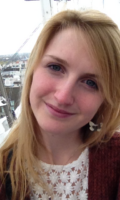My doctoral research journey: understanding the psychosocial and biological risk factors of AMR in the human gut microbiome

GW4 spoke with Lorna Flintham, a final year PhD student, whose research project was sparked by a GW4 AMR Alliance-initiated cross-departmental workshop at the University of Bath designed to foster novel interdisciplinary AMR research.
Here she describes her wide-ranging doctoral research journey at Bath (including a stint in the UK parliament) which is focused on understanding the psychosocial and biological risk factors of AMR in the human gut microbiome to inform behavioural interventions.
As I enter the final year of my PhD, I find myself reflecting on the incredible journey I’ve had at the University of Bath. My research, developed through a GW4 AMR Alliance initiative, is an interdisciplinary exploration that bridges three disciplines - health sciences, psychology, and biology. Over the course of my project, I’ve examined how lifestyle behaviours—like diet and exercise—affect the gut microbiome and, in turn, influence the risk of AMR. The intersection of these diverse academic fields has offered a unique approach to tackling AMR from multiple perspectives, making for an exciting and multifaceted journey so far.
What makes my work truly thrilling is being part of an interdisciplinary ‘dream team’ that blends three disciplines and supervisors in the Department for Health (Dr Francoise Koumanov), Dept. of Life Sciences (Prof Ed Feil) and Dept. Psychology (Dr Charlotte Dack & Dr Ben Ainsworth). This fusion of perspectives has given me the chance to explore AMR in a holistic way that I never imagined. From analysing metagenomic data from Thailand to interviewing older community members, my research has taken me on an international and diverse exploration of AMR. I’ve also had the privilege of examining how the clinical status of inpatients might influence AMR, and more importantly, identifying where we can direct efforts for the most effective interventions.
Of course, being embedded across three disciplines has posed its challenges. At times, I’ve watched enviously as my PhD colleagues have become experts in their specific fields, leaving me feeling like a ‘Jack of all trades, master of none’—one moment diving into microbiome modulation papers, the next completing Reflexive Thematic Analysis Reporting Guidelines (RTARG) checklists. But given the complex and multifaceted nature of resistant infections, I’ve come to truly appreciate the value of approaching AMR from a broader, interconnected perspective.
Beyond the walls of the university, my PhD has provided opportunities to apply my research in new and impactful ways. Through a BSAC-funded parliamentary internship, I worked with Baroness Natalie Bennett of Manor Castle, crafting AMR-related content for political debates, government questions, and online articles. This experience not only taught me the power of a compelling phrase but also gave me an invaluable insight into how academic research can be translated into tangible political action.
With just one year left, I’m preparing for a final systematic literature review and the inevitably arduous writing process. While the stress (and likely caffeine addiction) is real, I’m genuinely excited to see how all the pieces of this research puzzle come together—and, of course, to share my findings with the world soon.






